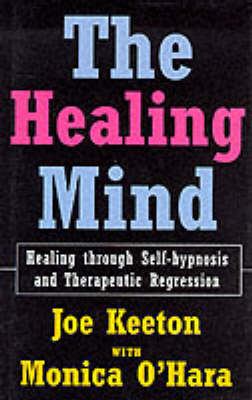
The Healing Mind
Healing Through Self-hypnosis and Therapeutic Regression
Seiten
1998
Robert Hale Ltd (Verlag)
978-0-7090-6147-2 (ISBN)
Robert Hale Ltd (Verlag)
978-0-7090-6147-2 (ISBN)
- Titel ist leider vergriffen;
keine Neuauflage - Artikel merken
Describing the unconscious nervous system (UNS) as eleven-twelfths of our brain (the conscious making up the remainder), this book stresses the importance of using it to its full capacity. It cites examples of the healing mind in action and demonstrates how self-hypnosis can be such a potent form of treatment.
Joe Keeton, the author of the highly acclaimed "The Power of the Mind", sees hypnosis as a means of tapping into our mental computer, in order to access the rich material stored away in its vaults. By plugging into these deeply etched circuits, he shows how it is possible to re-activate dormant abilities and correct malfunctions in our immune systems. Keeton's patients, having this gained access to their unconscious mind, are taught self-hypnosis and instructed to practice daily in order to retain the ability and to counteract the potential side-effects of prescribed medication. Describing the unconscious nervous system (UNS) as eleven-twelfths of our brain (the conscious making up the remainder), the author stresses the importance of using it to its full capacity. Keeton originally became known for his work in pre-birth regressions but, aware of the potential for health, doctors persuaded him to concentrate instead on the therapeutic aspects. Most of us understand how hypnosis can successfully treat emotional and psychological disorders. What is less easy to understand is how it can relieve physical conditions. Yet a variety of skin complaints respond easily to hypnosis.
Blood conditions and the various forms of arthritis have also been successfully treated in this way. This book cites innumerable examples of the healing mind in action and demonstrates how self-hypnosis can be such a potent form of treatment. The question is, why was it overlooked for so long?
Joe Keeton, the author of the highly acclaimed "The Power of the Mind", sees hypnosis as a means of tapping into our mental computer, in order to access the rich material stored away in its vaults. By plugging into these deeply etched circuits, he shows how it is possible to re-activate dormant abilities and correct malfunctions in our immune systems. Keeton's patients, having this gained access to their unconscious mind, are taught self-hypnosis and instructed to practice daily in order to retain the ability and to counteract the potential side-effects of prescribed medication. Describing the unconscious nervous system (UNS) as eleven-twelfths of our brain (the conscious making up the remainder), the author stresses the importance of using it to its full capacity. Keeton originally became known for his work in pre-birth regressions but, aware of the potential for health, doctors persuaded him to concentrate instead on the therapeutic aspects. Most of us understand how hypnosis can successfully treat emotional and psychological disorders. What is less easy to understand is how it can relieve physical conditions. Yet a variety of skin complaints respond easily to hypnosis.
Blood conditions and the various forms of arthritis have also been successfully treated in this way. This book cites innumerable examples of the healing mind in action and demonstrates how self-hypnosis can be such a potent form of treatment. The question is, why was it overlooked for so long?
Joe Keeton was one of Britain's best-known hypnotherapists and lecturers, the subject of several books and television programmes. He was co-author of the highly acclaimed New Hope Through Hypnotherapy and Encounters with the Past. This book is the sequel to The Power of the Mind, first published by Robert Hale in 1988, and reprinted several times. Joe Keeton died in 2003. Monica O'Hara was Joe Keeton's wife. Medical journalist and author of several books of non-fiction, she has contributed to several medical journals, is a former agony aunt for a national glossy magazine, health correspondent of an evening newspaper and press officer for one of the country's leading university hospitals. She is also a practising graphologist.
| Erscheint lt. Verlag | 30.11.1998 |
|---|---|
| Verlagsort | London |
| Sprache | englisch |
| Maße | 153 x 216 mm |
| Gewicht | 630 g |
| Themenwelt | Sachbuch/Ratgeber ► Gesundheit / Leben / Psychologie |
| Geisteswissenschaften ► Psychologie ► Biopsychologie / Neurowissenschaften | |
| Geisteswissenschaften ► Psychologie ► Humanistische Psychotherapien | |
| ISBN-10 | 0-7090-6147-1 / 0709061471 |
| ISBN-13 | 978-0-7090-6147-2 / 9780709061472 |
| Zustand | Neuware |
| Haben Sie eine Frage zum Produkt? |
Mehr entdecken
aus dem Bereich
aus dem Bereich
Buch | Hardcover (2012)
Westermann Schulbuchverlag
CHF 44,90
Schulbuch Klassen 7/8 (G9)
Buch | Hardcover (2015)
Klett (Verlag)
CHF 29,90
Buch | Softcover (2004)
Cornelsen Verlag
CHF 23,90


